51.1.2.4.5.6 (51 > 59)
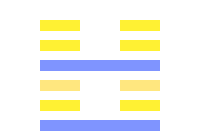
51.1.2.4.5.6 (51 > 59) - THE KĂN HEXAGRAM.
- 1. The first line, undivided, shows its subject, when the movement approaches, looking out and around with apprehension, and afterwards smiling and talking cheerfully. There will be good fortune.
- 2. The second line, divided, shows its subject, when the movement approaches, in a position of peril. He judges it better to let go the articles (in his possession), and to ascend a very lofty height. There is no occasion for him to pursue after (the things he has let go) ; in seven days he will find them.
- 4. The fourth line, undivided, shows its subject, amid the startling movements, supinely sinking (deeper) in the mud.
- 5. The fifth line, divided, shows its subject going and coming amidst the startling movements (of the time), and always in peril ; but perhaps he will not incur loss, and find business (which he can accomplish).
- 6. The topmost line, divided, shows its subject, amidst the startling movements (of the time), in breathless dismay and looking round him with trembling apprehension. If he take action, there will be evil. If, while the startling movements have not reached his own person and his neighbourhood, (he were to take precautions), there would be no error, though his relatives might (still) speak against him.
51.1.2.4.5.6 (51 > 59) - Shock
One carefully weighs the chances of being able to reach one's goal without any resistance.
Bing DeepL Google Yandex51.1.2.4.5.6 (51 > 59) - Shock
One carefully weighs the chances of being able to reach one's goal without any resistance.
Bing DeepL Google Yandex51.1.2.4.5.6 (51 > 59) - Kán, l’ébranlement
Kán : tonnerre, effroi répandu, crainte.
- 1. Le tonnerre approchant, on est plein d’effroi ; puis, quand il est passé, on sourit et on parle tous ensemble (on passe de la crainte à la joie).
- 2. Quand le tonnerre gronde, le danger arrive, on croit devoir tout abandonner et se retirer en un lieu sûr et élevé. Qu’on ne s’obstine pas à rechercher alors ce qu’on a abandonné ; on le retrouvera quelque temps après. (Quand le danger sera passé.)
- 4. Le tonnerre approchant trouble et interdit [avant même l’éclair].
- 5. Le tonnerre allant et venant répand l’effroi ; mais on doit tâcher de ne pas abandonner les affaires entreprises. Même dans le danger pressant, on doit garder le milieu.
-
6. Le tonnerre répand l’effroi et fait partout regarder avec trouble et crainte. S’il atteint et frappe, il causera un grand mal. (Ou : il corrige le mal.) Mais s’il ne frappe ni tel personnage, ni ses voisins, ce ne sera point un mal et fera seulement jaser les habitants d’une même maison.
Quand le tonnerre gronde, que l’orage éclate, le sage recherche la cause de ce fait (et tâche de profiter de l’avertissement céleste).
51.1.2.4.5.6 (51 > 59) - Le choc
On soupèse attentivement les chances que l'on aurait de pouvoir atteindre son but sans se voir opposer la moindre résistance.
Bing DeepL Google Yandex51.1.2.4.5.6 (51 > 59) - Megrázkódtatás
- 1. Nevethet miután meglátja.
- 2. Ne keresse ami elveszett.
- 4. Meg kell szabadítania magát a többiektől mielőtt tovább mehetne.
- 5. Szilárdan áll a megrázkódtatás kezdetekor és végigkíséri a többieket míg véget nem ér.
- 6. Elvesztette a leggyengébbet, visszafogottnak kell maradnia míg nem változnak.
The trigrams
The trigrams are combinations of three yin and yang lines. The three bottom lines of the hexagram form the lower trigram and represent the inner situation. The three top lines form the upper trigram and represent the outer situation.
Upper trigram: The thunder The wind


Lower trigram: The thunder The water


The formation: 51
What is already there

51 - THE KĂN HEXAGRAM.
Kăn gives the intimation of ease and development. When (the time of) movement (which it indicates) comes, (the subject of the hexagram) will be found looking out with apprehension, and yet smiling and talking cheerfully. When the movement (like a crash of thunder) terrifies all within a hundred lî, he will be (like the sincere worshipper) who is not (startled into) letting go his ladle and (cup of) sacrificial spirits.
Bing DeepL Google Yandex51 - Shock
Something is coming which enables the identification of a problem.
Bing DeepL Google Yandex51 - Shock
Something is coming which enables the identification of a problem.
Bing DeepL Google Yandex51 - Kán, l’ébranlement
Kán : tonnerre, effroi répandu, crainte.
Kán« tonnerre, effroi se répandant, appréhension ». Le tonnerre survenant répand l’effroi ; par l’effroi, les rires et les causeries s’arrêtent court. Le tonnerre terrifie cent lis, mais ne doit pas arrêter la cuiller du sacrifice aux esprits (le sacrifice) 1.
1 Le tonnerre peut arrêter tout mais pas empêcher le sacrifice.
Texte
Le tonnerre approchant répand l’effroi ; les rires, les causeries s’arrêtent subitement. Le tonnerre terrifie cent lis, mais ne doit pas arrêter la cuiller du sacrifice aux esprits.
Commentaire
Cet effroi a d’heureux résultats. Les rires et les causeries gardent ainsi la mesure. Le tonnerre terrifie ce qui est loin comme ce qui est près. Mais on doit, quand même, garder le temple des ancêtres, les autels des génies du sol et présider aux sacrifices. (Malgré l’effroi, on ne peut les interrompre.)
Symbolisme
Le tonnerre répété forme l’hexagramme. Le sage, plein de crainte et de scrupules prudents, observe et corrige.
51 - Megrázkódtatás
Valami közelít ami lehetővé teszi a probléma felismerését.
Bing DeepL Google Yandex
51.1 (51 > 16) - THE KĂN HEXAGRAM.
The first line, undivided, shows its subject, when the movement approaches, looking out and around with apprehension, and afterwards smiling and talking cheerfully. There will be good fortune.
Bing DeepL Google Yandex51.1 (51 > 16) - Kán, l’ébranlement
Kán : tonnerre, effroi répandu, crainte.
Le tonnerre approchant, on est plein d’effroi ; puis, quand il est passé, on sourit et on parle tous ensemble (on passe de la crainte à la joie).
Bing DeepL Google Yandex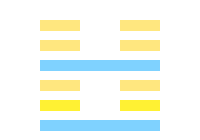
51.2 (51 > 54) - THE KĂN HEXAGRAM.
The second line, divided, shows its subject, when the movement approaches, in a position of peril. He judges it better to let go the articles (in his possession), and to ascend a very lofty height. There is no occasion for him to pursue after (the things he has let go) ; in seven days he will find them.
Bing DeepL Google Yandex51.2 (51 > 54) - Kán, l’ébranlement
Kán : tonnerre, effroi répandu, crainte.
Quand le tonnerre gronde, le danger arrive, on croit devoir tout abandonner et se retirer en un lieu sûr et élevé. Qu’on ne s’obstine pas à rechercher alors ce qu’on a abandonné ; on le retrouvera quelque temps après. (Quand le danger sera passé.)
Bing DeepL Google Yandex
51.4 (51 > 24) - THE KĂN HEXAGRAM.
The fourth line, undivided, shows its subject, amid the startling movements, supinely sinking (deeper) in the mud.
Bing DeepL Google Yandex51.4 (51 > 24) - Being bogged down
One has to free oneself from others before one can go any further.
Bing DeepL Google Yandex51.4 (51 > 24) - Being bogged down
One has to free oneself from others before one can go any further.
Bing DeepL Google Yandex51.4 (51 > 24) - Kán, l’ébranlement
Kán : tonnerre, effroi répandu, crainte.
Le tonnerre approchant trouble et interdit [avant même l’éclair].
Bing DeepL Google Yandex51.4 (51 > 24) - Être embourbé
On doit se libérer des autres avant de pouvoir aller plus loin.
Bing DeepL Google Yandex51.4 (51 > 24) - Megrázkódtatás
Meg kell szabadítania magát a többiektől mielőtt tovább mehetne.
Bing DeepL Google Yandex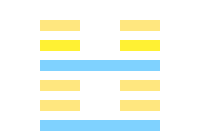
51.5 (51 > 17) - THE KĂN HEXAGRAM.
The fifth line, divided, shows its subject going and coming amidst the startling movements (of the time), and always in peril ; but perhaps he will not incur loss, and find business (which he can accomplish).
Bing DeepL Google Yandex51.5 (51 > 17) - Getting pushed around
One holds firm when the tremors begin, accompanies the others and endures them until they stop.
Bing DeepL Google Yandex51.5 (51 > 17) - Getting pushed around
One holds firm when the tremors begin, accompanies the others and endures them until they stop.
Bing DeepL Google Yandex51.5 (51 > 17) - Kán, l’ébranlement
Kán : tonnerre, effroi répandu, crainte.
Le tonnerre allant et venant répand l’effroi ; mais on doit tâcher de ne pas abandonner les affaires entreprises. Même dans le danger pressant, on doit garder le milieu.
Bing DeepL Google Yandex51.5 (51 > 17) - Se faire bousculer
On se tient fermement quand les secousses commencent, on accompagne les autres et on les endure jusqu'à ce qu'elles cessent.
Bing DeepL Google Yandex51.5 (51 > 17) - Megrázkódtatás
Szilárdan áll a megrázkódtatás kezdetekor és végigkíséri a többieket míg véget nem ér.
Bing DeepL Google Yandex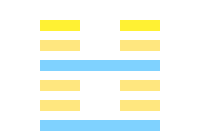
51.6 (51 > 21) - THE KĂN HEXAGRAM.
The topmost line, divided, shows its subject, amidst the startling movements (of the time), in breathless dismay and looking round him with trembling apprehension. If he take action, there will be evil. If, while the startling movements have not reached his own person and his neighbourhood, (he were to take precautions), there would be no error, though his relatives might (still) speak against him.
Bing DeepL Google Yandex51.6 (51 > 21) - Taking refuge in the heights
One has lost the weakest, so one keeps a low profile until they change.
Bing DeepL Google Yandex51.6 (51 > 21) - Taking refuge in the heights
One has lost the weakest, so one keeps a low profile until they change.
Bing DeepL Google Yandex51.6 (51 > 21) - Kán, l’ébranlement
Kán : tonnerre, effroi répandu, crainte.
Le tonnerre répand l’effroi et fait partout regarder avec trouble et crainte. S’il atteint et frappe, il causera un grand mal. (Ou : il corrige le mal.) Mais s’il ne frappe ni tel personnage, ni ses voisins, ce ne sera point un mal et fera seulement jaser les habitants d’une même maison.
Quand le tonnerre gronde, que l’orage éclate, le sage recherche la cause de ce fait (et tâche de profiter de l’avertissement céleste).
51.6 (51 > 21) - Se réfugier dans les hauteurs
On a perdu les plus faibles alors on reste discret jusqu'à ce qu'ils changent.
Bing DeepL Google Yandex51.6 (51 > 21) - Megrázkódtatás
Elvesztette a leggyengébbet, visszafogottnak kell maradnia míg nem változnak.
Bing DeepL Google YandexIn the making: 59
What is poised to happen

59 - THE HWÂN HEXAGRAM.
Hwân intimates that (under its conditions) there will be progress and success. The king goes to his ancestral temple ; and it will be advantageous to cross the great stream. It will be advantageous to be firm and correct.
Bing DeepL Google Yandex59 - Hwán, la dissolution
Hwán : extension, exposition, développement, abondance débordante ; dispersion, dissipation.
Hvan « extension, abondance débordant de biens, se développant heureusement ». Le prince qui fréquente le temple des ancêtres réussira et traversera les difficultés 1 ; il parviendra au sommet.
1 Moyen d’obtenir cette abondance.
[left]Texte
[/left]
[left]« Abondance débordante ». Le prince qui fréquente le temple de ses ancêtres traversera heureusement les difficultés ; il parviendra à une prospérité ferme.
[/left]
Commentaire
La puissance lui viendra sans diminuer. — Fréquentant le temple des ancêtres, il observera le milieu fixe. — Les hommes condescendants et bons auront leurs places convenables au dehors et le grand fera régner l’harmonie. (On les donnera convenablement.)
Symbolisme
Le vent soufflant au-dessus de l’eau forme le Koua de hwân, disperser. Les anciens rois faisaient le sacrifice à Shang-Ti et élevaient des temples ancestraux.
The nuclear hexagram: 39.1.3.5.6 (39 > 27)
The nuclear hexagram is the association of the two inner trigrams (lines 2,3,4 and 3,4,5). It represents the root, or the origin of the situation.
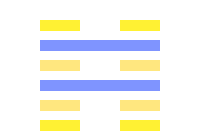
39.1.3.5.6 (39 > 27) - THE KIEN HEXAGRAM.
- 1. From the first line, divided, we learn that advance (on the part of its subject) will lead to (greater) difficulties, while remaining stationary will afford ground for praise.
- 3. The third line, undivided, shows its subject advancing, (but only) to (greater) difficulties. He remains stationary, and returns (to his former associates).
- 5. The fifth line, undivided, shows its subject struggling with the greatest difficulties, while friends are coming to help him.
- 6. The topmost line, divided, shows its subject going forward (only to increase) the difficulties, while his remaining stationary will be (productive of) great (merit). There will be good fortune, and it will be advantageous to meet with the great man.
39.1.3.5.6 (39 > 27) - Hearing only bits and pieces
One hopes having understood what others have said.
Bing DeepL Google Yandex39.1.3.5.6 (39 > 27) - Hearing only bits and pieces
One hopes having understood what others have said.
Bing DeepL Google Yandex39.1.3.5.6 (39 > 27) - Kién, l’obstacle
Kién : Difficulté, danger, noble hardiesse.
-
1. Si l’on va (courageusement) aux choses difficiles, on reviendra comblé de louanges.
Il convient d’être ferme. - 3. L’un va aux difficultés et revient après au repos. Ou : qui va aux difficultés (courageusement) revient aux profits (en obtient).
- 5. C’est dans les difficultés que les amis se montrent.
-
6. Un autre y va également et revient plus éclairé et intelligent.
Il a la juste mesure.
Un dernier y va de même et revient plein de mérite et de succès. Il atteint les qualités du grand homme.
39.1.3.5.6 (39 > 27) - N'entendre que des bribes
On espère avoir compris ce que les autres ont dit.
Bing DeepL Google Yandex39.1.3.5.6 (39 > 27) - Bizonytalanság
- 1. Mások ellenállnak mert nem ellenőrizte, így közvetítőt kér hogy felülvizsgálják a munkáját.
- 3. Azt akarják hogy visszajöjjön.
- 5. Problémák amiket nem oldhat meg egyedül, látogatókat kap amikor szükség van rájuk.
- 6. Kéri eltávolodott barátait hogy térjenek vissza.
Ruler
The starting situation

51.6 (51 > 21) - THE KĂN HEXAGRAM.
The topmost line, divided, shows its subject, amidst the startling movements (of the time), in breathless dismay and looking round him with trembling apprehension. If he take action, there will be evil. If, while the startling movements have not reached his own person and his neighbourhood, (he were to take precautions), there would be no error, though his relatives might (still) speak against him.
Bing DeepL Google Yandex51.6 (51 > 21) - Taking refuge in the heights
One has lost the weakest, so one keeps a low profile until they change.
Bing DeepL Google Yandex51.6 (51 > 21) - Taking refuge in the heights
One has lost the weakest, so one keeps a low profile until they change.
Bing DeepL Google Yandex51.6 (51 > 21) - Kán, l’ébranlement
Kán : tonnerre, effroi répandu, crainte.
Le tonnerre répand l’effroi et fait partout regarder avec trouble et crainte. S’il atteint et frappe, il causera un grand mal. (Ou : il corrige le mal.) Mais s’il ne frappe ni tel personnage, ni ses voisins, ce ne sera point un mal et fera seulement jaser les habitants d’une même maison.
Quand le tonnerre gronde, que l’orage éclate, le sage recherche la cause de ce fait (et tâche de profiter de l’avertissement céleste).
51.6 (51 > 21) - Se réfugier dans les hauteurs
On a perdu les plus faibles alors on reste discret jusqu'à ce qu'ils changent.
Bing DeepL Google Yandex51.6 (51 > 21) - Megrázkódtatás
Elvesztette a leggyengébbet, visszafogottnak kell maradnia míg nem változnak.
Bing DeepL Google YandexCorrection
The direction where the ruler is going to bend
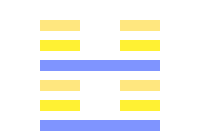
51.1.2.4.5 (51 > 29) - THE KĂN HEXAGRAM.
- 1. The first line, undivided, shows its subject, when the movement approaches, looking out and around with apprehension, and afterwards smiling and talking cheerfully. There will be good fortune.
- 2. The second line, divided, shows its subject, when the movement approaches, in a position of peril. He judges it better to let go the articles (in his possession), and to ascend a very lofty height. There is no occasion for him to pursue after (the things he has let go) ; in seven days he will find them.
- 4. The fourth line, undivided, shows its subject, amid the startling movements, supinely sinking (deeper) in the mud.
- 5. The fifth line, divided, shows its subject going and coming amidst the startling movements (of the time), and always in peril ; but perhaps he will not incur loss, and find business (which he can accomplish).
51.1.2.4.5 (51 > 29) - Shock
One goes straight ahead so as not to be tempted by the distractions that others offer.
Bing DeepL Google Yandex51.1.2.4.5 (51 > 29) - Shock
One goes straight ahead so as not to be tempted by the distractions that others offer.
Bing DeepL Google Yandex51.1.2.4.5 (51 > 29) - Kán, l’ébranlement
Kán : tonnerre, effroi répandu, crainte.
- 1. Le tonnerre approchant, on est plein d’effroi ; puis, quand il est passé, on sourit et on parle tous ensemble (on passe de la crainte à la joie).
- 2. Quand le tonnerre gronde, le danger arrive, on croit devoir tout abandonner et se retirer en un lieu sûr et élevé. Qu’on ne s’obstine pas à rechercher alors ce qu’on a abandonné ; on le retrouvera quelque temps après. (Quand le danger sera passé.)
- 4. Le tonnerre approchant trouble et interdit [avant même l’éclair].
- 5. Le tonnerre allant et venant répand l’effroi ; mais on doit tâcher de ne pas abandonner les affaires entreprises. Même dans le danger pressant, on doit garder le milieu.
51.1.2.4.5 (51 > 29) - Le choc
On va tout droit pour ne pas être tenté par les distractions que les autres proposent.
Bing DeepL Google Yandex51.1.2.4.5 (51 > 29) - Megrázkódtatás
- 1. Nevethet miután meglátja.
- 2. Ne keresse ami elveszett.
- 4. Meg kell szabadítania magát a többiektől mielőtt tovább mehetne.
- 5. Szilárdan áll a megrázkódtatás kezdetekor és végigkíséri a többieket míg véget nem ér.

